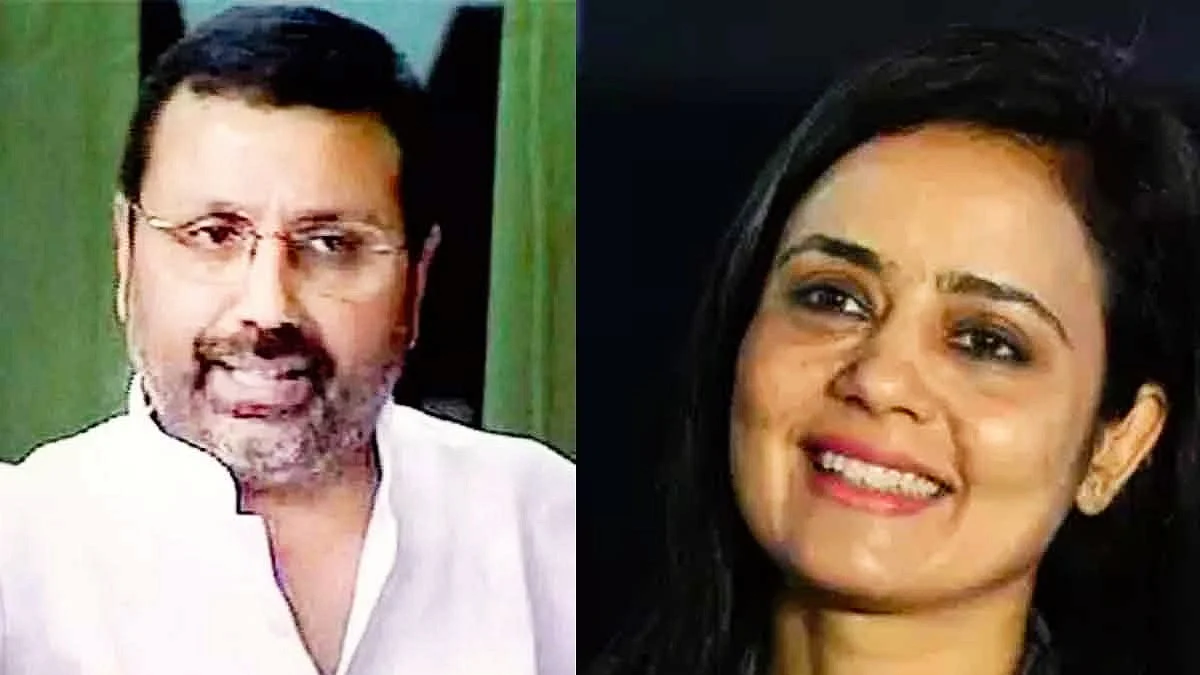How did Mahua Moitra compromise national security? Read Nishikant Dubey’s reply
A large section of people and media believe Moitra breached rules when she shared login details to the Lok Sabha members' portal. The question ‘which rules’ is yet to be answered

“Did the MP share login details with a third party abroad or not? If yes, the nation wants disqualification for a corrupt person who, for 40 pieces of silver, can sell the country and its safety,” is a sentiment shared by many when it comes to the allegations against Trinamool Congress MP Mahua Moitra, expelled from the Lok Sabha on Friday in the cash for query case.
Among the allegations she faces are receiving gifts and cash from a Dubai-based businessman to ask questions against the Adani Group in Parliament, and sharing her login details to the LS members' portal with the businessman, thereby compromising national security.
The Parliamentary ethics committee which probed the allegations, too, has insinuated in its 104-page report that by sharing the login details, national security was compromised.
The committee apparently asked the complainant, BJP MP Dr Nishikant Dubey, how sharing login details with a third person compromised national security. Dubey's reply, as recorded by the committee, is classic.
"You call a technical expert. I am not a technical expert. But I know because before that I have also worked in a telephone company that if someone enters your system, that is why Gmail is called a public platform. Gmail is not used by the Government of India. She uses her own. They create their own systems… that is why NIC is still an agency of the Government of India. He has not given it to any private agency. It is national security. If someone goes into your system, then any information can be easily removed from there.”
The garbled and incoherent reply appears to suggest that Moitra was using Gmail and a public platform, thus compromising national security. Dubey also appears to suggest that Moitra is guilty of ‘removing’ information ‘from there’ (the portal?).
The committee does not appear to have asked the BJP MP which telephone company he had worked for and in which capacity. The committee, though, did ask Moitra which hotel she stayed in while visiting Dubai and with whom. Dubey was also not asked which specific information was removed by Moitra and from where.
In her reply to the committee, Moitra pointed out that neither NIC nor the Lok Sabha had circulated any login rules for asking questions online. She also replied that she had not shared her official email or password with anyone, but merely her login ID to the members’ portal.
Possibly sensing that the complainant’s reply, presumably in writing, was weak, the Union ministry chipped in by informing that the members’ portal contained several draft bills like the J&K Delimitation Bill for consideration of the Lok Sabha. These bills are circulated to MPs so as to prepare them to discuss them in the house. Since they are not in the public domain, it is suggested that vested interests accessing them is somehow not in the national interest.
It is, of course, a naïve statement because once circulated to MPs, they can, if they want, share the details with various lobbies, vested interests or experts, even without giving them access to the members’ portal.
The ethics committee also appears to have taken Jai Anant Dehadrai’s averments at face value. Dehadrai painstakingly listed questions posed by Moitra and pointed out that questions related to trade between India and Bangladesh, on ports, and the quality of telecom services and comparative details of call-drops etc. were linked to business interests of Moitra’s ‘friend’, industrialist Darshan Hiranandani.
Even a question by Moitra on what the government was doing to bring down the price of steel, Dehadrai claimed, was motivated because the Hiranandani family was deeply troubled by high prices of steel that were hitting their real estate business.
If this line of investigation, or rather inquisition, is legitimate, Moitra can legitimately ask the Lok Sabha to look into the questions asked by Dubey and, indeed, other MPs and see which business interests or business houses could be interested in the replies from the government to those questions.
Follow us on: Facebook, Twitter, Google News, Instagram
Join our official telegram channel (@nationalherald) and stay updated with the latest headlines